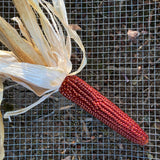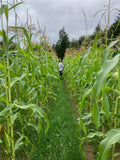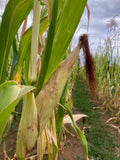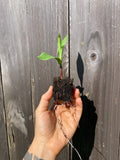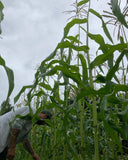Floriani Red Flint Corn
Zea mays
Spina rossa della Valsugana (red-spined of Valsugana) is a beautiful landrace from the Sugana Valley of Italy, grown by subsistence farmers as a staple until the mid-20th century. It is estimated to have arrived in Italy during the 16th century on Spanish ships returning from the Americas, and it has adapted to the climate of the foothills of the Alps in Northern Italy. More recently, North American growers named it ‘Floriani Red Flint’ to recognize the generosity of the Floriani family in sharing their seed with William Rubel, who reintroduced this corn to its ancestral home of North America in 2008 after a trip to northern Italy.
Floriani is a red flint, standing 7-10 feet tall, and reaching maturity in 100 days. It seems well adapted to North American growing conditions showcasing high genetic diversity. The kernels are typically bright red and pointed and when ground into cornmeal, they display deep yellow with hints of pink. You can expect to see ears ranging in color from red to yellow. Not only is this corn stunning, you can taste how it was carefully selected by Italian farmers and Indigenous farmers in the Americas each growing season for millennia. In Italy, it was traditionally used to make polenta flour. Expect one ear per plant and take into consideration its tendencies to lodge, especially with a heavy wind.
Days to maturity: 100
Seeds per pack: 115-130
Germination rate: 94% on 11/04/2025
Planting / harvesting notes
Corn requires warm soil to germinate. Wait a week or two after the last frost and sow seeds directly in the ground. Plant in rows 2-3' apart. For good pollination, it is better to plant at least 3-5 shorter rows next to each other rather than one or two long rows. Sow 1" deep and thin to every 6-12" within the row. Keep soil moist until germination. Consider planting successions every few weeks for continual harvest.
Seed keeping notes
Corn is wind pollinated and should be isolated by 2-3 miles from other varieties of corn to avoid unwanted cross-pollination. Another option is to separate your corn plantings by 3-4 weeks so they do not flower/tassel at the same time. Allow the cobs and kernels to dry on the plants before harvesting for seed. If you are concerned about neighbor's corn plots hybridizing yours, consider only harvesting seed from the plants towards the middle of your plot, leaving the outer rows for eating. If necessary, lay out the cobs to do some final drying before removing the husks and seeds.







